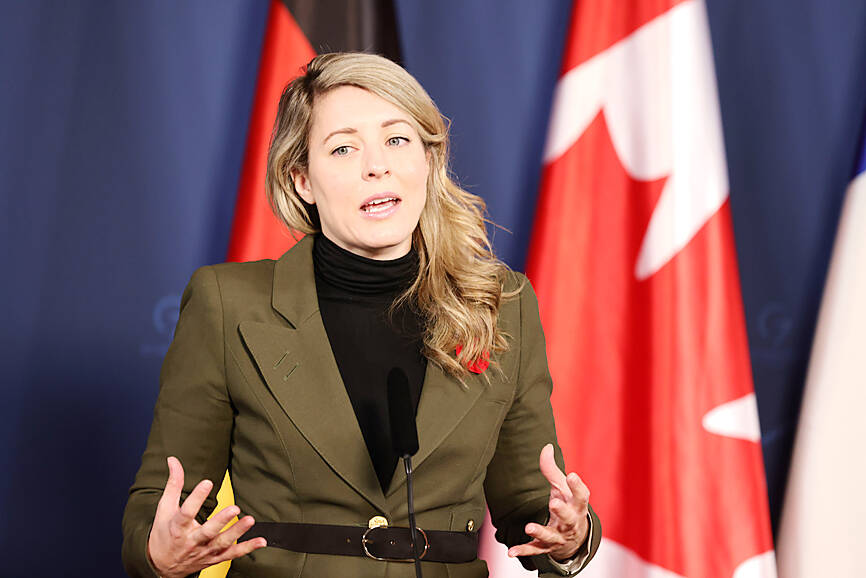Canada’s new Indo-Pacific strategy calls for changes to foreign investment screening as a result of concerns about Chinese state-owned enterprises, a development that comes less than two weeks after Chinese President Xi Jinping (習近平) lectured Canadian Prime Minister Justin Trudeau on the sidelines of a G20 summit.
Trudeau’s government is revising the Investment Canada Act, a key law governing foreign investment, to add new provisions to protect the country’s infrastructure, resources, technology, supply chains and intellectual property, according to a strategy document released yesterday.
The document does not outline specific amendments to the law, but says Canada is to act “decisively when investments from state-owned enterprises and other foreign entities threaten our national security.”

Photo: EPA-EFE
It is part of a section on the country’s new approach toward China, which Trudeau’s government describes as an “increasingly disruptive global power” that disregards international rules and norms.
“We need to make sure we protect our national security, period,” Canadian Minister of Foreign Affairs Melanie Joly said during an interview in Montreal. “The goal of reopening this act is really to make sure that we have an approach that is much more transparent and that brings predictability.”
Canada has already moved to limit Chinese investment in some critical minerals, ordering Chinese firms to divest from three junior lithium explorers earlier this month.
Also this month, police arrested a former Hydro-Quebec employee and charged him with espionage for allegedly obtaining trade secrets for China. The man was a researcher on battery materials.
Chinese foreign direct investment in Canada reached C$21 billion (US$15.67 billion) last year while Canadian direct investments in China were above C$14 billion, according to Statistics Canada.
Joly, who characterized herself as pragmatic, said the business community should know the geopolitical risks of dealing with China.
“My job is to highlight that,” she said, adding that diplomacy comes with “what we stand for,” even if it might harden relationships.

SETBACK: Apple’s India iPhone push has been disrupted after Foxconn recalled hundreds of Chinese engineers, amid Beijing’s attempts to curb tech transfers Apple Inc assembly partner Hon Hai Precision Industry Co (鴻海精密), also known internationally as Foxconn Technology Group (富士康科技集團), has recalled about 300 Chinese engineers from a factory in India, the latest setback for the iPhone maker’s push to rapidly expand in the country. The extraction of Chinese workers from the factory of Yuzhan Technology (India) Private Ltd, a Hon Hai component unit, in southern Tamil Nadu state, is the second such move in a few months. The company has started flying in Taiwanese engineers to replace staff leaving, people familiar with the matter said, asking not to be named, as the

The prices of gasoline and diesel at domestic fuel stations are to rise NT$0.1 and NT$0.4 per liter this week respectively, after international crude oil prices rose last week, CPC Corp, Taiwan (台灣中油) and Formosa Petrochemical Corp (台塑石化) announced yesterday. Effective today, gasoline prices at CPC and Formosa stations are to rise to NT$27.3, NT$28.8 and NT$30.8 per liter for 92, 95 and 98-octane unleaded gasoline respectively, the companies said in separate statements. The price of premium diesel is to rise to NT$26.2 per liter at CPC stations and NT$26 at Formosa pumps, they said. The announcements came after international crude oil prices

SinoPac Financial Holdings Co (永豐金控) is weighing whether to add a life insurance business to its portfolio, but would tread cautiously after completing three acquisitions in quick succession, president Stanley Chu (朱士廷) said yesterday. “We are carefully considering whether life insurance should play a role in SinoPac’s business map,” Chu told reporters ahead of an earnings conference. “Our priority is to ensure the success of the deals we have already made, even though we are tracking some possible targets.” Local media have reported that Mercuries Life Insurance Co (三商美邦人壽), which is seeking buyers amid financial strains, has invited three financial

CAUTION: Right now, artificial intelligence runs on faith, not productivity and eventually, the risk of a bubble will emerge,’ TIER economist Gordon Sun said Taiwanese manufacturers turned more optimistic last month, ending a five-month streak of declining sentiment as concerns over US tariffs, currency volatility and China’s overcapacity began to ease, the Taiwan Institute of Economic Research (TIER) said yesterday. The manufacturing business confidence index rose 1.17 points from June to 86.8, its first rebound since February. TIER economist Gordon Sun (孫明德) attributed the uptick to fading trade uncertainties, a steadier New Taiwan dollar and reduced competitive pressure from Chinese producers. Taiwan’s semiconductor industry is unlikely to face significant damage from Washington’s ongoing probe into semiconductors, given the US’ reliance on Taiwanese chips to power artificial